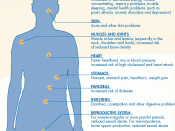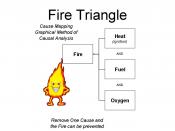1.0 Introduction
Throughout the eighties and into the nineties, work stress have continued to rise dramatically in organizations across North America. The eighties saw employees stressing out from working in a rapidly growing economy. During the nineties, beginning from the recession of 1992 till present day, employees are stressed by their own job insecurities in the face of massive downsizing and restructuring of organizations in order to be competitive on the global stage. Work stress is a very extensive topic ranging from research on the sources of stress, the effects of stress, to ways on managing and reducing stress. This report will focus first on the evidence for the harmful effects of stress at work, both mentally and physically. The last section will briefly explain why management should be concerned with rising employee stress and will describe some actions management can take to alleviate work stress.
2.0 Harmful Effects of Stress
Most research studies indicate a high correlation between stress and illness.
According to authorities in the United States and Great Britain, as much as 70% of patients that are treated by general practitioners are suffering from symptoms originating from stress . Everyone experiences stress, however, each person responds to stress very differently. Their response is dependent on how each person reacts to stress emotionally, mentally, and physically. There are, however, common effects of stress for most people on the physical and mental body.
2.1 Physical Effects
The researcher Blyth in 1973 identified a list of diseases which have a fairly high causal relationships with stress. His evidence was obtained through interviews with medical experts, review of reports by the World Health Organization and consultations with the J.R. Geigy Pharmaceutical Company. The following is a list of some of the illnesses Blyth had identified :
1. Hypertension2. Coronary thrombosis3. Hay...


